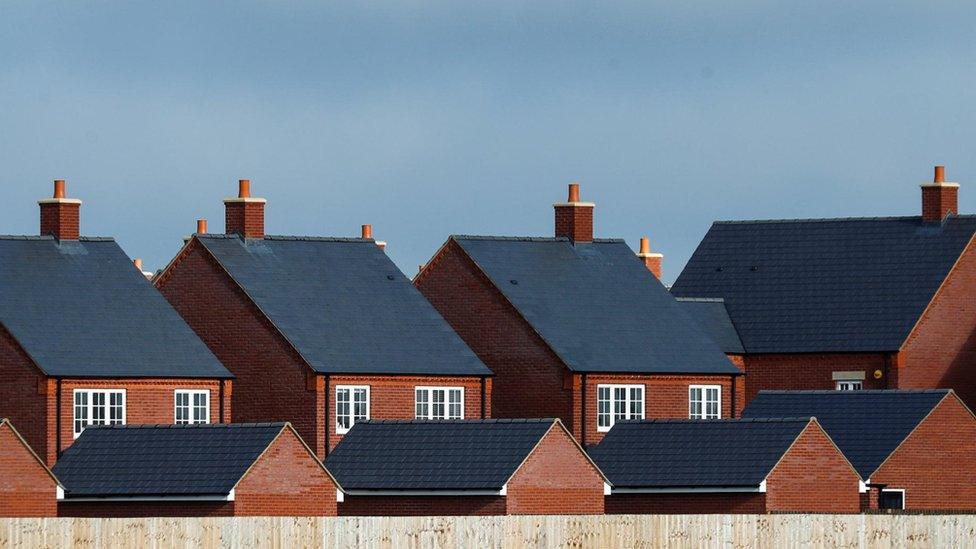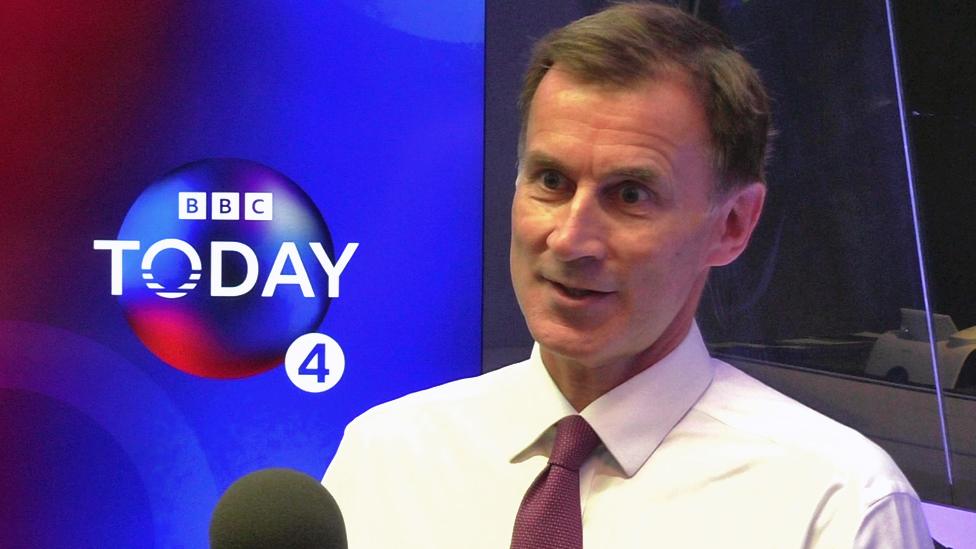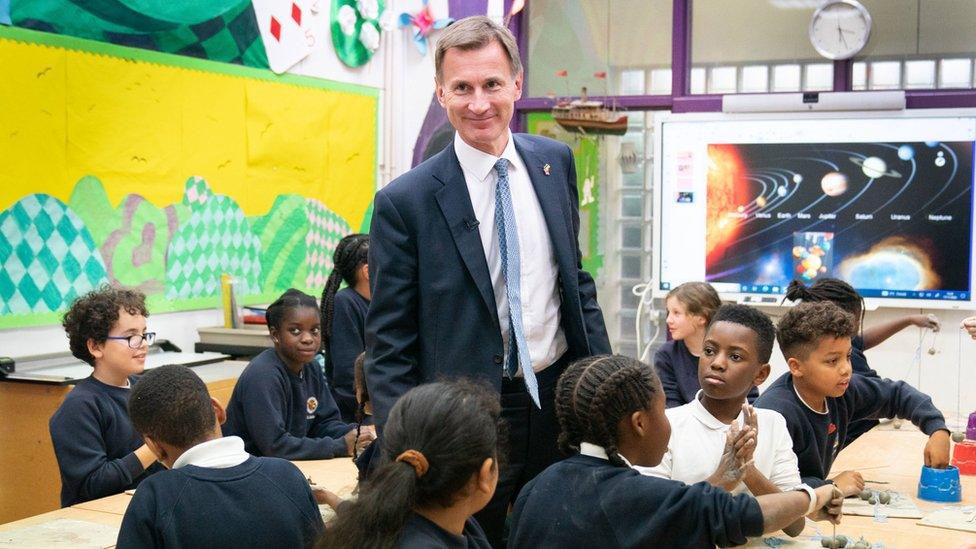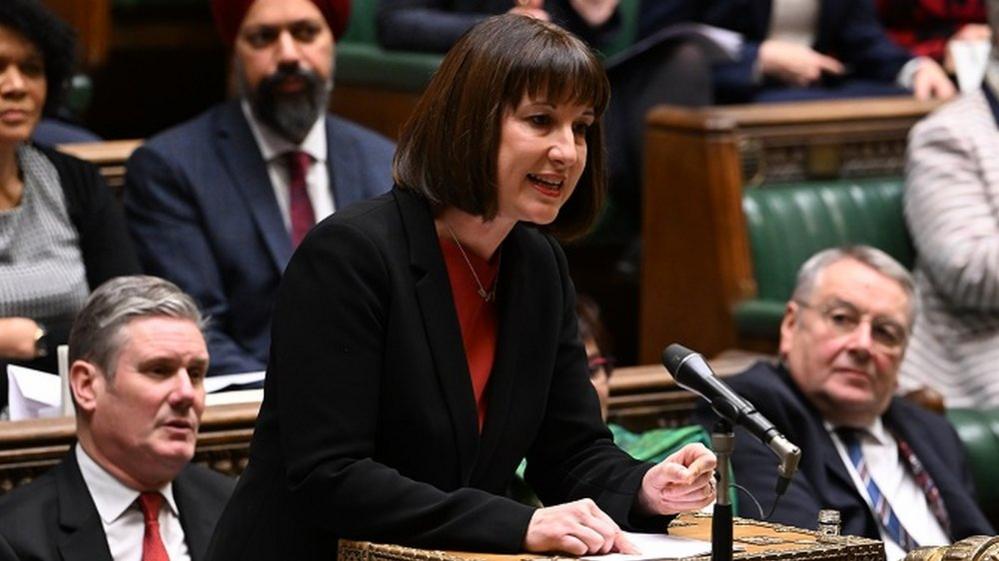Most areas in England to see 5% council tax rise
- Published
- comments

Most English councils are expected to raise council tax by 5%, according to the Treasury.
Chancellor Jeremy Hunt on Thursday announced English local authorities will be able to increase council tax by 5% annually without a referendum.
Councils warned an increase would be "extremely difficult" for people given the cost-of-living crisis, but 95% are expected to opt for the full rise.
Mr Hunt insisted his plan would get the UK through an economic "storm".
Treasury analysis predicted almost all councils would increase payments by the full 5% permitted, a spokesperson said. Although the spokesperson did not explain what the assumption was based on, the Local Government Authority (LGA), the membership body for councils, said 150 out of 152 used the precept last year.
It means in some areas the average Band D council tax bill could go over £2,000 for the first time, although other areas already pay more than that.
Council tax pays for local budgets and can be spent as the local authority sees fit, according to the House of Commons library.
"It is not possible to say that council tax pays for particular local services: it is pooled with revenue from business rates, government grants and other sources of income," the library says, external.
Currently a referendum is triggered if councils want to raise council tax by more than 2%, although they can also raise it by a further 1% specifically for social care.
Following the Autumn Statement, local authorities will be allowed to raise council tax by 3% and those which also have social care responsibilities can also increase it by a further two percent (a total increase of 5%) without a local vote.
The Local Government Association (LGA), which represents 331 of the 333 councils in England, said although the financial outlook looks better, council tax would not plug their shortfalls.
LGA chairman councillor James Jamieson said: "We have been clear that council tax has never been the solution to meeting the long-term pressures facing services - particularly high-demand services like adult social care, child protection and homelessness prevention.
"It also raises different amounts of money in different parts of the country unrelated to need and adding to the financial burden facing households."
Mortgage fears
Councillor Shaun Davies, council leader for Telford and Wrekin Council and leader of LGA Labour, said he was not willing to increase council tax because his residents can not afford it, but assumes government will order local authorities to increase council tax by at least 2% for the social care levy.
Speaking to the BBC Radio Shropshire, he described residents telling him about the price of food rapidly increasing and homeowners contacting the council for housing advice because they could not afford their mortgage.
He said: "In all consciousness I can't increase council tax at a time when families are struggling.
"That will mean tough decisions for us as a council, as a result of that underfunding from government and the low council tax that we receive already.
"But I'm not prepared to put onto families and households more tax as a result of this budget."
He added the Autumn Statement meant there would be further cuts to public services at time when it requires "urgent resuscitation" and the demand is "going through the roof".
The County Councils Network, which represents 36 mainly Conservative authorities, said despite Mr Hunt's plan they still face "very difficult decisions" alongside high inflation and rising social care costs.
Chairman Tim Oliver said "some county leaders may be reluctant" to impose 5% hikes "during a cost-of-living crisis considering ratepayers in county areas currently pay the highest bills on average".
Surrey County Council, which Mr Oliver leads, said it hoped it would not have to increase council tax by 5% but was waiting to see how much funding it would receive for 2023-2024 from the government, when figures are released next month.
This was echoed by the Labour leader of Manchester City Council, Bev Craig. However, she said even if Manchester did raise council tax they would still have to cut services. The authority's website states it forecasts a funding gap of £28m in 2023-2024 rising to £96m by 2025-2026.
If Manchester City Council did raise council tax by 1% this would only raise £2m she said, and a 5% increase would generate £10m.
Ms Craig also hit out at the council tax system, saying it enabled more prosperous counties to raise more money. If Surrey County Council increased council tax by 1% it would raise £8.2m in comparison to Manchester's £2m. This she said is "unfair and unsustainable".
"It hits people's pockets unfairly and doesn't create a sustainable funding model across the country," she said.
"Manchester has high levels of poverty and people struggling. It's not fair or equal or equitable way to pay for services after 12 years of cuts."
The Conservative leader of Devon County Council, John Hart, also said the authority would consider whether to raise council tax or not when it finds out its next budget from the government just before Christmas.
The options facing Devon are "increasing council tax by more than we would like or potentially making deep cuts in services that are valued by people across the county.
"Unfortunately, we may well have to do both next year. It will be a very difficult balancing act."
He added he recognised that people across Devon are facing real issues with the cost of living and Devon County Council does not want to increase their burden any more than necessary. But it raising council tax "is an option that needs to be considered in our budget preparation", he said.
Councillor Georgia Gould, chair of London Councils, said that borough finances remained in a "critical condition". She maintained that council tax was "not the answer" and said the rise made the cost of living crisis "extremely difficult for struggling households" and "it could never plug that £700m funding gap".
Watch: Chancellor defends the impact of his Autumn Statement on "squeezed middle"
Labour's shadow chancellor Rachel Reeves told BBC News: "If you look at what's happening in March next year, I am very worried about a whole range of things that are set to happen at the moment.
"Big increases in gas and electricity bills, the increases in council tax, the increases in income and the increases in fuel duty."
The independent Office for Budget Responsibility said the government's plan will raise £3.3bn in 2026/27, rising to £4.8bn in 2027/28.
In a statement, the Department for Levelling Up, Housing and Communities said: "We understand the pressures facing councils and we are working with them to ensure vital services are protected.
"Councils will have the flexibility to raise money through council tax, but we expect them to exercise restraint. Protecting the most vulnerable households remains our priority and those on the lowest incomes are able to apply for council tax reductions."

UP CLOSE AND PERSONAL: Louis Theroux Interviews Dame Judi Dench
CARS V BIKES: Are the UK's roads too dangerous for cyclists?

- Published18 November 2022

- Published18 November 2022

- Published17 November 2022
